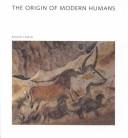Check nearby libraries
Buy this book

Where and when did modern humans (Homo sapiens) first appear? Who were our immediate evolutionary ancestors? What features distinguish modern humans and how did these features arise? These questions have gripped the scientific community and the public since the mid-nineteenth century, when the discovery of Neanderthal Man and the publication of Darwin's Origin of Species rocked the foundations of long-held beliefs on the subject.
Many new findings, speculations, and reevaluations have sharpened our views of modern human origins since then. Nevertheless, the controversy continues, as the patchy fossil record and new evidence derived from genetic techniques have given rise to competing theories. Are we the result of a single uninterrupted lineage, with each distinct species of human leading directly to the next?
Or, do species such as the Neanderthal represent offshoots of an evolutionary tree that died out without leaving successors? Did modern humanity arise roughly contemporaneously in different parts of the world or from a single species in a single location? And how do biological, linguistic, artistic, and technological factors distinguish Homo sapiens from near and distant relatives?
At stake in the argument is nothing less than the very definition of what it means, biologically and culturally, to be human.
In this vividly written volume, award-winning science author Roger Lewin describes the discoveries, the intellectual clashes, and the often conflicting interpretations of evidence that have shaped the current debate on modern humanity's origin.
Readers will learn of astonishing findings (the original Neanderthal bones, and provocative theories (the genetically-derived speculation that we are all the children of a single African female who lived about 200,000 years ago), as well as one preposterous hoax (the Piltdown Man).
Readers will also see the evolution of the modern science of paleoanthropology, which brings molecular biology, genetics, population biology, linguistics, and other disciplines into the search for the distinctive stamp of Homo sapiens in artifacts and skeletal remains.
Check nearby libraries
Buy this book

Showing 1 featured edition. View all 1 editions?
| Edition | Availability |
|---|---|
|
1
The origin of modern humans
1993, Scientific American Library, Distributed by W.H. Freeman
in English
0716750392 9780716750390
|
aaaa
Libraries near you:
WorldCat
|
Book Details
Edition Notes
Includes bibliographical references (p. [188]-192) and index.
Classifications
The Physical Object
ID Numbers
Community Reviews (0)
Feedback?History
- Created April 1, 2008
- 10 revisions
Wikipedia citation
×CloseCopy and paste this code into your Wikipedia page. Need help?
| July 24, 2024 | Edited by MARC Bot | import existing book |
| January 14, 2023 | Edited by ImportBot | import existing book |
| December 26, 2021 | Edited by ImportBot | import existing book |
| November 16, 2020 | Edited by MARC Bot | import existing book |
| April 1, 2008 | Created by an anonymous user | Imported from Scriblio MARC record |









